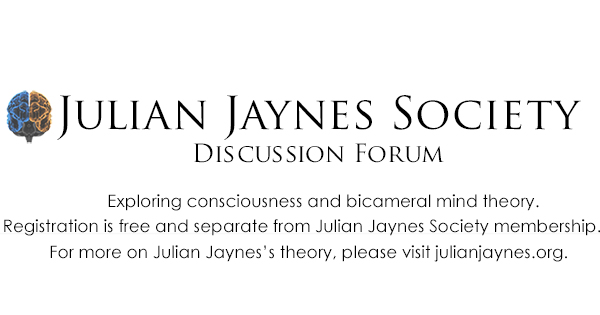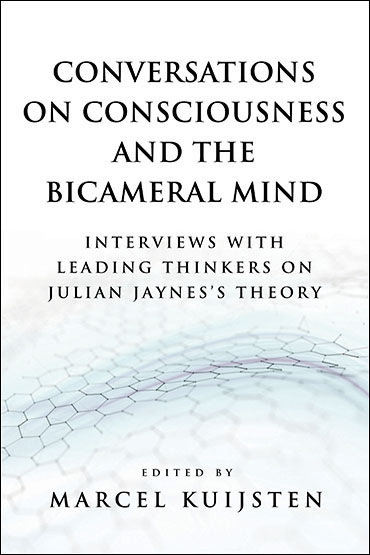I’m actually working on writing something right now that connects to Jaynes’ theory. It’s going to be a three-part book, which hopefully will challenge a lot of people’s underlying assumptions.
The first part draws parallels between the current sociopolitical situation in the United States and that of Ancient Greece (specifically around the time of Plato).
The second part kind of does the opposite; instead of talking about how the present is similar to the past, I discuss differences. I really do like the idea of having a book that “pushes back against itself”. In this second section, I mention Jaynes’ theory, then I elaborate on it a bit.
My thesis is that the transition from bicamerality to fully “modern” consciousness actually took several steps. Consciousness can take several different forms depending on the preferred metaphors used for the self. In addition, individual people can sometimes display features of multiple types. I use “simple consciousness” to refer to the most common consciousness in the modern West (the so-called “neurotypical” mentality).
Prior to that point, in the medieval era, I suggest that Europeans generally possessed a different kind which I call “layered consciousness”. It takes some space to explain, but the gist of it is that unconsciously held, culture-wide associations—mass synesthesia and ideasthesia, basically—helped medieval minds make sense of reality and remember important information. Everything is potentially more than what it appears to be; texts, utterances and physical objects are all potentially allegories or icons that open onto other layers of reality.
As with bicamerality, most of the people who possessed layered consciousness were illiterate. Modern studies have shown that people with synesthesia often show greatly enhanced (eidetic) memory, a trait which would have been especially advantageous to people like medieval peasants, who couldn’t simply write down what they needed to remember.
The difference from the bicameral mentality is that people with LC did still have a sense of self as well (albeit a “porous” rather than “buffered” one, as Charles Taylor put it). A lot of features of religion and ritual in the Middle Ages make more sense when seen this way. When this mentality broke down, massive societal changes followed (the Renaissance, Reformation, Enlightenment, etc…) These changes in turn shaped the newest, “simple” kind of consciousness.
Many of what we today call “neurodivergent” conditions, such as dyslexia, the autism spectrum, ADHD, and of course synesthesia itself, could be vestiges of layered consciousness. In addition, it seems likely that the most fervent adherents of QAnon and other “conspirituality” subcultures possess something close to a layered consciousness.
I suggest that layered consciousness first arose during a period of extensive Greek-Jewish dialogue, a century or two before Christianity itself did. (This was after both peoples had already been conquered by the Romans). The concept of sin, (“missing the mark” from how things ought to be) would have originated around then as well.
Now, prior to this point, there was yet a different mentality. The Classical Greek philosophers, after the end of the bicameral era, would have had an “agonistic consciousness”, common in highly militaristic societies. This is characterized by the idea of the noble lie (told by those in power in order to maintain social control). Someone with this mentality sees the world as a constant battle for dominance, with a perpetual need for self-preservation. Both truth and morality are relative to whoever is in power (i.e., “might makes right”). There is a strong overlap between agonistic consciousness and the modern “Dark Triad” of personality traits. This kind of consciousness never totally disappeared, and still persists to this day, especially among upper socioeconomic classes. Friedrich Nietzsche is one of the famous modern proponents of this mentality; another is Constin Alamariu. One could say that person like this has a consciousness, but no _conscience_.
An illustrative example is the changing attitudes towards lying. According to Jaynes, people with the bicameral mentality couldn’t lie. Whereas, the later “agonistic” Greeks lied freely in order to maintain their dominance over those lower on the social ladder than themselves. Still later, people with layered consciousness could lie, but would have felt intense guilt and/or shame upon doing so (because it was a sin to lie). However they could also “stretch the truth” by speaking abstrusely or non-literally (so-called “mental reservation”)
As for the final chapter of my book, it will be more personal and will focus on who I am, where I got the ideas in the book, and why others might benefit from reading it.
I have not yet finalized title, but I do want to use a “Rosetta Stone” theme for it and the cover design. This is because the book has three parts, but also because it’s supposed to help people who “think differently” from each other come to more of a mutual understanding.
I am working on a book…
General discussion regarding Jaynes's theory of consciousness and the bicameral mind. Please only post your topic here only if it does not fit into a more specific category below.
-
minnespectrum
- Posts: 20
- Joined: Tue Jul 11, 2023 3:12 pm
Return to “General Discussion”
Jump to
- JJS Forum
- ↳ General Discussion
- ↳ News Items Related to Jaynes's Theory
- ↳ Book Discussion: The Origin of Consciousness and Julian Jaynes Society Publications
- ↳ Myths, Misconceptions, and Fact Checks About Julian Jaynes's Theory
- ↳ Brian J. McVeigh's Random Thoughts
- ↳ Julian Jaynes
- ↳ Conferences, Events, and Local Discussion Groups
- ↳ Lecture Discussion
- ↳ Interview and Q&A Discussion
- ↳ 1.0. Hypothesis One: Consciousness Based On Language
- ↳ 1.01. Hypothesis One: Consciousness Based On Language | Subtopic: Consciousness & Dreams
- ↳ 1.02. Hypothesis One: Consciousness Based On Language | Subtopic: Consciousness in Children
- ↳ 1.03. Hypothesis One: Consciousness Based On Language | Subtopic: Consciousness and AI
- ↳ 2.0. Hypothesis Two: The Bicameral Mind
- ↳ 2.1. Hypothesis Two: The Bicameral Mind | Subtopic: Auditory Hallucinations in Normal Adults
- ↳ 2.2. Hypothesis Two: The Bicameral Mind | Subtopic: Hallucinations & Imaginary Companions in Children
- ↳ 2.3. Hypothesis Two: The Bicameral Mind | Subtopic: Hypnosis, Possession & Altered States of Consciousness
- ↳ 2.4. Hypothesis Two: The Bicameral Mind | Subtopic: Religion & the Bicameral Mind
- ↳ 2.5. Hypothesis Two: The Bicameral Mind | Subtopic: Schizophrenia
- ↳ 2.6. Hypothesis Two: The Bicameral Mind | Subtopic: The Mentality of Pre-Literate & Pre-Modern Peoples
- ↳ 3.0. Hypothesis Three: Dating the Development of Consciousness
- ↳ 4.0. Hypothesis Four: Jaynes's Neurological Model for the Bicameral Mind
- ↳ The Bicameral Mind in Fiction, Film & Popular Culture
- ↳ Information for Students


